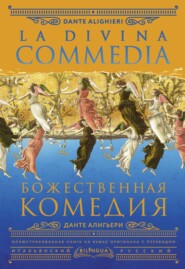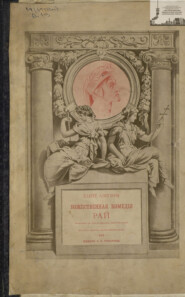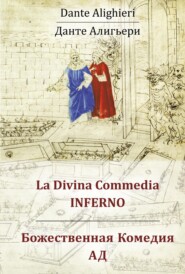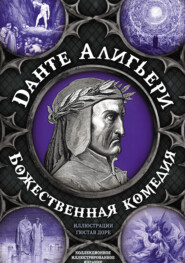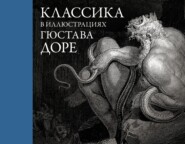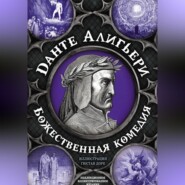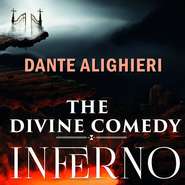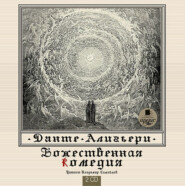По всем вопросам обращайтесь на: info@litportal.ru
(©) 2003-2025.
✖
The Divine Comedy
Настройки чтения
Размер шрифта
Высота строк
Поля
The Divine Comedy
Dante Alighieri
Издание на английском языке. «Божественная комедия» – это величайшее произведение мировой литературы, написанное в XIV веке итальянским поэтом Данте Алигьери, которое стало вершиной его творчества, а также одним из ключевых текстов западной литературы.
Поэма разделена на три части: ад, чистилище и рай, и описывает путешествие Данте, который проводит читателя через мир грехов и искупления, открывая глубины человеческой души и ее стремление к истине и благодати. Это великое произведение не только увлечет читателя своей сюжетной линией, но подтолкнет к размышлениям на вечные темы: смысл жизни, вера, надежда, истина и судьба. Произведение дано без адаптации и сокращений, в переводе на английский язык. Изучайте английский с интересом!
Данте Алигьери
The Divine Comedy
© ООО "Издательство АСТ", 2024
Hell or the Inferno
Canto I
In the midway of this our mortal life,
I found me in a gloomy wood, astray
Gone from the path direct: and e'en to tell
It were no easy task, how savage wild
That forest, how robust and rough its growth,
Which to remember only, my dismay
Renews, in bitterness not far from death.
Yet to discourse of what there good befell,
All else will I relate discover'd there.
How first I enter'd it I scarce can say,
Such sleepy dullness in that instant weigh'd
My senses down, when the true path I left,
But when a mountain's foot I reach'd, where clos'd
The valley, that had pierc'd my heart with dread,
I look'd aloft, and saw his shoulders broad
Already vested with that planet's beam,
Who leads all wanderers safe through every way.
Then was a little respite to the fear,
That in my heart's recesses deep had lain,
All of that night, so pitifully pass'd:
And as a man, with difficult short breath,
Forespent with toiling, 'scap'd from sea to shore,
Turns to the perilous wide waste, and stands
At gaze; e'en so my spirit, that yet fail'd
Struggling with terror, turn'd to view the straits,
That none hath pass'd and liv'd. My weary frame
After short pause recomforted, again
I journey'd on over that lonely steep,
The hinder foot still firmer. Scarce the ascent
Began, when, lo! a panther, nimble, light,
And cover'd with a speckled skin, appear'd,
Nor, when it saw me, vanish'd, rather strove
To check my onward going; that ofttimes
With purpose to retrace my steps I turn'd.
The hour was morning's prime, and on his way
Aloft the sun ascended with those stars,
That with him rose, when Love divine first mov'd
Those its fair works: so that with joyous hope
All things conspir'd to fill me, the gay skin
Of that swift animal, the matin dawn
And the sweet season. Soon that joy was chas'd,
And by new dread succeeded, when in view
A lion came, 'gainst me, as it appear'd,
With his head held aloft and hunger-mad,
That e'en the air was fear-struck. A she-wolf
Was at his heels, who in her leanness seem'd
Full of all wants, and many a land hath made
Disconsolate ere now. She with such fear
O'erwhelmed me, at the sight of her appall'd,
That of the height all hope I lost. As one,
Who with his gain elated, sees the time
When all unwares is gone, he inwardly
Mourns with heart-griping anguish; such was I,
Haunted by that fell beast, never at peace,
Who coming o'er against me, by degrees
Impell'd me where the sun in silence rests.
While to the lower space with backward step
I fell, my ken discern'd the form one of one,
Whose voice seem'd faint through long disuse of speech.
When him in that great desert I espied,
“Have mercy on me!” cried I out aloud,
“Spirit! or living man! what e'er thou be!”
He answer'd: “Now not man, man once I was,
And born of Lombard parents, Mantuana both
By country, when the power of Julius yet
Was scarcely firm. At Rome my life was past
Beneath the mild Augustus, in the time
Of fabled deities and false. A bard
Was I, and made Anchises' upright son
The subject of my song, who came from Troy,
When the flames prey'd on Ilium's haughty towers.
But thou, say wherefore to such perils past
Return'st thou? wherefore not this pleasant mount
Ascendest, cause and source of all delight?”
“And art thou then that Virgil, that well-spring,
From which such copious floods of eloquence
Have issued?” I with front abash'd replied.
Dante Alighieri
Издание на английском языке. «Божественная комедия» – это величайшее произведение мировой литературы, написанное в XIV веке итальянским поэтом Данте Алигьери, которое стало вершиной его творчества, а также одним из ключевых текстов западной литературы.
Поэма разделена на три части: ад, чистилище и рай, и описывает путешествие Данте, который проводит читателя через мир грехов и искупления, открывая глубины человеческой души и ее стремление к истине и благодати. Это великое произведение не только увлечет читателя своей сюжетной линией, но подтолкнет к размышлениям на вечные темы: смысл жизни, вера, надежда, истина и судьба. Произведение дано без адаптации и сокращений, в переводе на английский язык. Изучайте английский с интересом!
Данте Алигьери
The Divine Comedy
© ООО "Издательство АСТ", 2024
Hell or the Inferno
Canto I
In the midway of this our mortal life,
I found me in a gloomy wood, astray
Gone from the path direct: and e'en to tell
It were no easy task, how savage wild
That forest, how robust and rough its growth,
Which to remember only, my dismay
Renews, in bitterness not far from death.
Yet to discourse of what there good befell,
All else will I relate discover'd there.
How first I enter'd it I scarce can say,
Such sleepy dullness in that instant weigh'd
My senses down, when the true path I left,
But when a mountain's foot I reach'd, where clos'd
The valley, that had pierc'd my heart with dread,
I look'd aloft, and saw his shoulders broad
Already vested with that planet's beam,
Who leads all wanderers safe through every way.
Then was a little respite to the fear,
That in my heart's recesses deep had lain,
All of that night, so pitifully pass'd:
And as a man, with difficult short breath,
Forespent with toiling, 'scap'd from sea to shore,
Turns to the perilous wide waste, and stands
At gaze; e'en so my spirit, that yet fail'd
Struggling with terror, turn'd to view the straits,
That none hath pass'd and liv'd. My weary frame
After short pause recomforted, again
I journey'd on over that lonely steep,
The hinder foot still firmer. Scarce the ascent
Began, when, lo! a panther, nimble, light,
And cover'd with a speckled skin, appear'd,
Nor, when it saw me, vanish'd, rather strove
To check my onward going; that ofttimes
With purpose to retrace my steps I turn'd.
The hour was morning's prime, and on his way
Aloft the sun ascended with those stars,
That with him rose, when Love divine first mov'd
Those its fair works: so that with joyous hope
All things conspir'd to fill me, the gay skin
Of that swift animal, the matin dawn
And the sweet season. Soon that joy was chas'd,
And by new dread succeeded, when in view
A lion came, 'gainst me, as it appear'd,
With his head held aloft and hunger-mad,
That e'en the air was fear-struck. A she-wolf
Was at his heels, who in her leanness seem'd
Full of all wants, and many a land hath made
Disconsolate ere now. She with such fear
O'erwhelmed me, at the sight of her appall'd,
That of the height all hope I lost. As one,
Who with his gain elated, sees the time
When all unwares is gone, he inwardly
Mourns with heart-griping anguish; such was I,
Haunted by that fell beast, never at peace,
Who coming o'er against me, by degrees
Impell'd me where the sun in silence rests.
While to the lower space with backward step
I fell, my ken discern'd the form one of one,
Whose voice seem'd faint through long disuse of speech.
When him in that great desert I espied,
“Have mercy on me!” cried I out aloud,
“Spirit! or living man! what e'er thou be!”
He answer'd: “Now not man, man once I was,
And born of Lombard parents, Mantuana both
By country, when the power of Julius yet
Was scarcely firm. At Rome my life was past
Beneath the mild Augustus, in the time
Of fabled deities and false. A bard
Was I, and made Anchises' upright son
The subject of my song, who came from Troy,
When the flames prey'd on Ilium's haughty towers.
But thou, say wherefore to such perils past
Return'st thou? wherefore not this pleasant mount
Ascendest, cause and source of all delight?”
“And art thou then that Virgil, that well-spring,
From which such copious floods of eloquence
Have issued?” I with front abash'd replied.






